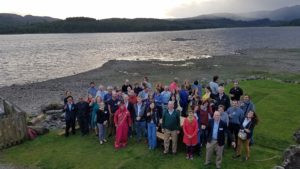2018 Joint GLOBOLAKES-GEO AquaWatch Meeting, Stirling, UK

The joint meeting of the GLOBOLAKES and GEO AquaWatch Water Quality Information for the Benefit of Society – Earth Observation of inland and coastal water quality: recent developments, priorities & public engagement was held at the University of Stirling, UK on August 28-31, 2018. The workshop included two full days of oral presentations, poster sessions, and plenary discussions followed by one day of GEO AquaWatch planning. Day 1 of the workshop was dedicated to a GLOBOLAKES wrap-up. Day 2 was dedicated to summarizing knowledge gaps, opportunities, and challenges for the community as identified during some European Union Horizon 2020 and other global water quality projects. The remainder of the meeting was focused on the development of GEO AquaWatch tasks for the 2018-19.
See select presentations from the workshop agenda available below. A Workshop Report and Workshop Participant List are also available.
Presentations
Wednesday, August 29, 2018
GLOBOLAKES Wrap-Up
GEOAquaWatch Overview: Steven Greb, University of Wisconsin-Madison
GloboLakes: The Overview: Andrew Tyler, University of Stirling
Optical Water Types and LIMNADES: Vagelis Spyrakos, University of Stirling
Algorithm Development at the Global Scale: Water Quality: Peter Hunter, University of Stirling
Lake Surface Water Temperature: Laura Carerra, University of Reading
Near Real Time Data Processing and Calimnos: Stefan Simis, Plymouth Marine Laboratory
Estimating Drivers of Change: Mark Cutler, University of Dundee
Dealing with Data Uncertainty: Claire Miller, University of Glasgow
Clustering Lake Responses to Environmental Change: Mengyi Gong, University of Glasgow
Status and Attribution of Lake Water Quality: Laurence Carvalho, Centre for Ecology & Hydrology
Global Forecast of the Sensitivity of Lake Phytoplankton to Environmental Change: Ian Jones, Centre for Ecology & Hydrology
Global Seasonality of Lake Phytoplankton: Ellie Mackay, Centre for Ecology & Hydrology
Predicting Lake Surface Temperature Dynamics: Stephen Maberly, Centre for Ecology & Hydrology
Thursday, August 30, 2018
Knowledge Gaps, Challenges, and Opportunities Identified in Other International Programs
NERC Knowledge Exchange: EO in Industry and Regulation: Claire Neil/Andrew Tyler, University of Stirling
H2020 EOMORES: Steef Peters, Water Insight
Inland Water Products Within Copernicus Global Land Service: Kerstin Stelzer, Brockmann Consult, GmbH and associated Poster: Global Lake Water Products within the Copernicus Global Land Service
H2020 MONOCLE: Stefan Simis, Plymouth Marine Laboratory
H2020 CoastObs: Steef Peters, Water Insight
H2020 Coastal Water Data Cube: Carsten Brockmann, Brockmann Consult, GmbH and associated Poster:DATA CUBE SERVICE FOR COPERNICUS
A novel EO data interaction capability
H2020 DANUBIUS-Preparatory Phase: Andrew Tyler, University of Stirling
H2020 Co-ReSyF: Eirini Politi, University of Dundee but presenting on behalf of University College Cork and associated Poster: Integrating Satellite Data into Multi-disciplinary Coastal Research
UNESCO World Water Quality Portal: Thomas Heege, EOMAP GmbH & Co.KG
Water-related SDGs: Bilqis Hoque, Environment and Population Research Centre and Andrew Tyler, University of Stirling/Douglas Cripe, Group on Earth Observations (GEO) Secretariat/Merrie Beth Neely, GEOAquaWatch
GEMS/Water and SDGs: Deborah Chapman, United Nations Environment GEMS/Water and associated Poster: Sustainable Development Goal indicator for
ambient water quality – SDG 6.3.2
US CyAN Project: Blake Schaeffer, United States Environmental Protection Agency
US CoastWatch: Emily Smail, University of Maryland, NOAA-Affiliate
CEOS EO for Aquatic Ecosystems Study: Arnold Dekker, SAT-DEK
Trophic State Assessment of Global Inland Waters Using a MODIS-derived Forel-Ule Index: Shenglei Wang, RADI Chinese Academy of Sciences
Relevance of Thermal Forcing for Optical Remote Sensing of Stratified Lakes: Daniel Odermatt, Odermatt and Brockmann
Spatial and Temporal Perspectives on Multiple Stressor Impacts Spanning Inland to Coastal Ecosystems: John Schalles, Creighton University and associated Poster: The Dynamic Littoral Fringe – Spatial and Temporal Patterns in Community Structure
and Productivity in North American Coastal Ecosystems
Posters:
Developing A Universal Model for Estimating Secchi Disk Depth from Landsat TM and ETM+ in Indonesian Lakes, Fajar Setiawan, University of Tsukuba
Design Considerations for Aquatic Ecosystem Earth Observing System: Does this cover your requirements?, Arnold Dekker, SAT-DEK
